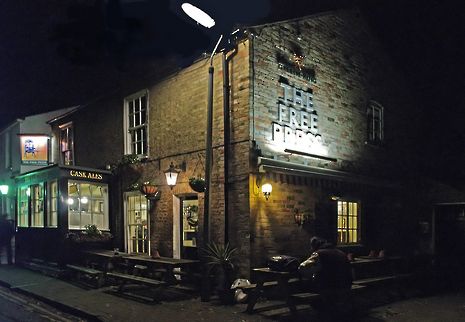
Reasons to be cheerful
Angus Jackson reflects on readjusting to Cambridge life, organised socialising and nights out

It’s mid–January: cold, dark, and depressing. It’s Week 3, and the energy and positivity you entered the new academic term with already feels a thing of the past. You spent most of Week 1 and 2 telling people you were still ‘readjusting’ to Cambridge, just ‘getting back into the swing of things’. But what you were really hoping for was not to return to the status quo, but for a miraculous change to have occurred within this 800–year–old institution which would reinvigorate your term. As yet, it has not arrived.
I spent a few hours this week in a pub, moaning. Well, just outside the pub actually, in the freezing winter air, as the place was crammed full of jovial punters. I need space, some peace and quiet, and dour surroundings to moan properly.
A friend and I were really going for it. For us, ‘readjusting’ to Cambridge had been a case of remembering. Remembering the way neither you, nor anyone else, has any time at all. Remembering the way everyone is caught up in their own world, stressing about things that don’t really matter. Remembering the feeling of constantly having to prove yourself, in every supervision, at every society, on every night out.
We found it especially easy to moan about the way socialising was so regimented in Cambridge: the way people scheduled organised fun into their timetables, booking club nights weeks in advance, spending days negotiating over the time and place to meet for a coffee, joining drinking societies so as to have a designated time, place and reason to think, ‘WE ARE SOCIALISING NOW’. We longed for the spontaneity of the holidays.
Moaning isn’t always a bad thing and probably has a worse reputation than it deserves, especially in Cambridge where there is a pressure to be ‘making the most’ of the ‘brilliant opportunities’ presented to us. It can be refreshing to get concerns off your chest and realise you’re not alone in thinking things aren’t perfect.
But moaning at the pub, in itself, does not solve anything. In fact, it leaves quite a bitter taste in the mouth. After a good few pints of moan, you want something a bit lighter, a pick–me–up, something which gives you less of a hangover.
Just as my friend and I reached peak-moan at the pub, a couple came outside to smoke and sat nearby, joking and laughing heartily. Suddenly aware of the negative tone of our conversation, we felt a little sheepish and determined to deal with our disgruntlement more proactively. We bought another round to determine a plan of action.
We concluded that our discussion was perhaps itself part of the problem, a symptom rather than a cure. It was certainly not nuanced and rather partially sighted. If we’d expressed our thoughts this way in an essay, it would be like the one you write when you can’t be bothered with analysing at all, so you just rant about something you hope is relevant – it usually isn’t. Most of all, it was deeply, deeply unoriginal. Part of the reason it had come so easily to us was because we’d heard it from so many people’s mouths during our time at Cambridge.
What I realised in the biting cold of that beer–garden this week was that to moan is the easy option. Yes, there is a culture of perfectionism and a feeling of constantly needing to prove oneself. But weren’t our complaints the very epitome of this culture? In always looking for Cambridge to change, for others to be better, we were simply carrying the ultra–ambitious, attainment–orientated agendas of supervisions into our lives more generally, to toxic effect. Shouldn’t we stop expecting things that aren’t possible and put less pressure on our experiences?
Sure, Cambridge isn’t perfect and there are serious problems it needs to address about its achievement–centred atmosphere and elitist undertones. But, to coin an agonisingly American-sounding phrase, perhaps we should turn moaning to owning, taking responsibility for what we can change ourselves and throwing ourselves into things positively, rather than just shouting from the sidelines.
The next night, me and the same friend went out with a new group of people, almost entirely unknown to us. Rather than coming up with expectations or making assumptions, we just went, had a good time, and moved on with our lives, unburdened by pressures and criticisms. But there is one thing this new attitude didn’t change: we still woke up with splitting hangovers.
